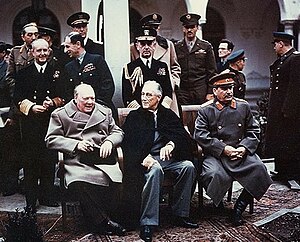Of course, the leaders of the East and the West didn't just look at their watches one day and decide "Hey! Let's have us a nice little geopolitical tugging match. That sounds like fun". The reality as with all history, it is a blend of events from all comers, though certainly there were moments that punctuated the timeline.
In my mind, and in the mind of many historians, the Yalta Conference laid the groundwork for the East-West struggle.

1945.1 The Yalta Conference
On February 4th, 1945, the Yalta Conference took place, deciding the status of post-WWII Germany. The Allies (the USA, the USSR, and Great Britain) met in the Black Sea coastal city of Yalta to discuss this postwar partitioning and adminstration of Germany, including a section for each of those countries, plus a portion reserved for France.
The "Big Three" (Roosevelt, Stalin, and Churchill) divided Germany into these four partitions, or occupation zones. These zones were named in a pretty straight-forward way: American, Soviet, British, and French. While these were the initial zones to be defined at Yalta, they would shift and in some cases combine in the future into the West/East Germanies that became the symbol of the Cold War to which many people could relate.
Also of great importance, both at the time of the conference and later on, The Allied nations agreed that free elections are to be held in all countries occupied by Nazi Germany. Of central interest in regards to the free election issue, Poland was was the first item on the Soviet agenda, for a number of reasons. Russia has been a country that has been invaded and overrun for centuries, and it was important to the USSR that Poland serve as a bulwark against that happening in the future. In essence, Poland would become a barrier to invasion, rather than the historical corridor it had been for many years.
In what seems to have been a disingenuous ploy in the conference negotiations, Stalin stated that since "the Russians had greatly sinned against Poland", "the Soviet government was trying to atone for those sins." Stalin concluded that "Poland must be strong" and that "the Soviet Union is interested in the creation of a mighty, free and independent Poland." As part of that, the demands of the Polish government-in-exile were considered immutable - the Soviet Union would keep their territory in eastern Poland (annexed in 1939) and Poland was to be compensated for that by extending its Western borders into Germany. In compliance with the stipulation on free elections, Stalin promised such in Poland. Of course, a Soviet-imposed communist puppet government already existed in Polish territories liberated by the Red Army.
(Stalin never honored his promise, and via rigged elections, Poland became officially communist in January 1947.)
It is also important to note that the United Nations sprang from this conference, slated to replace the failed League of Nations. In contemporary opinion, this level and type of failure for such a global alliance seems to be repeating history...
No comments:
Post a Comment